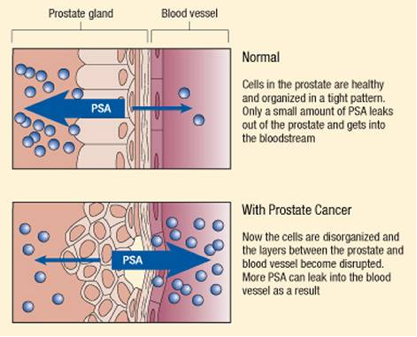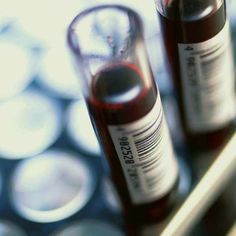What is the PSA test?
PSA stands for Prostate Specific Antigen, which is a protein produced by cells in the prostate. The level of PSA in the blood can be measured by a simple blood sample test. If prostate cells are abnormal in any way, and this includes getting older, they produce more PSA protein.

Normal PSA Blood Levels
These vary according to age, and are measures as nanograms per ml. ‘Normal’ PSA level is now generally accepted as being less than:
- 2.5 ng/ml for men 45-50
- 3.5 ng/ml for men aged 50-59
- 4.5 ng/ml for men aged 60-69
- 6.5 ng/ml for men aged 70 and over.
However, this is now being called into question. Some authorities have called for new guidelines to be implemented, and these are less than:
- 2ng/ml for men 45-50
- 3 ng/ml for men aged 50-59
- 4 ng/ml for men aged 60-69
- 5 ng/ml for men 70 and over
What is the Importance of PSA Testing?
On the face of it, it seems very obvious. If I get a very minor blood test from my GP, I can tell if I may have prostate cancer. If so, then the sooner I get it investigated and treated the better.
Sounds simple, but the reality is much different. The test itself is easy, and any GPs can organise it, but the result can open a Pandora’s Box of possible problems. This is because PSA is not a test of prostate cancer, instead is a demonstration of prostate cell disruption. Most men with raised PSAs do not have cancer, and some men with very normal PSAs will have a cancer.

The unfortunate reality is that this PSA test is just not specific enough, but it is still the only one we have.
-
Should I have a PSA test?
The arguments for and against population screening using the PSA test do not necessarily apply to an individual making his own personal decision to have this test performed. So, here are some of the pros and cons.
In Favour of the PSA Test- It may pick up an early prostate cancer before you get symptoms, and prevent the cancer from becoming advanced.
- It can be used to monitor you, if you are at higher risk of getting prostate cancer, such as if a near relative has it – especially at an early age – or if you are of African descent.
- A normal result will probably reassure.
- Repeat tests (each year) – if changing – can identify changes which may show there is a problem in your prostate gland.
Against Having a PSA Test- Over two-thirds of men with a raised PSA test do not have prostate cancer.
- It will not pick up all prostate cancers. Some men with prostate cancer have a normal PSA level.
- If your PSA is raised you may need further tests, which can cause anxiety and the tests may cause some side-effects.
- An individual PSA test cannot tell if a prostate cancer is slow or fast growing. A slow growing cancer may not cause any symptoms or shorten your life and may not need treatment, but will often cause unnecessary anxiety.

Pros of PSA screening
Cons of PSA screening
PSA screening may help us detect prostate cancer early Some prostate cancers are slow growing and never spread beyond the prostate gland. PSA testing is done by a simple, widely available blood test. The PSA test is not fool proof. It’s possible for PSA levels to be elevated when cancer isn’t present, and to be normal when cancer is present. Cancer is easier to treat and is more likely to be cured if it’s diagnosed in the early stages of the disease Not all prostate cancers need treatment. Treatments for prostate cancer may have risks and side effects, including urinary incontinence, erectile dysfunction or bowel dysfunction. For some of us, knowing is better than not knowing. Having the test can provide us with a certain amount of reassurance — either that we probably don’t have prostate cancer or that we do have it and can now have it treated. A diagnosis of prostate cancer can often provoke anxiety and confusion. Concern that the cancer may or may not be life-threatening can make decision making complicated. In some developed countries, the number of deaths from prostate cancer has gone down since PSA testing became available. It’s not yet clear whether the decrease in deaths from prostate cancer is due to early detection and treatment based on PSA testing or due to other factors. Slow-growing prostate cancer might not need treatment. We might be able to have regular check-ups, including PSA tests, to keep an eye on the cancer. This can avoid or delay the side effects of treatment If a PSA level is raised we usually need more tests, including a biopsy. The biopsy has some risks, such as pain, infection and blood in the urine and semen. Up to 1 in 50 men (two per cent) may get a serious infection after a biopsy Having regular PSA tests could be helpful for men who are more at risk of prostate cancer. This can help spot any changes in our PSA level, which might be a sign of prostate cancer. But we need more research to show how often we might need a test The PSA test can miss prostate cancer. Up to 1% of men with fast-growing dangerous prostate cancer have a normal PSA level. -
Why Do We Continue PSA Testing?
Because, imperfect as it is, PSA is still a valuable test, and the only one available. Most early prostatic cancers are not noticed by us, and are suspected on account of either:
- A raised PSA test.
- An abnormal Digital Rectal Examination (DRE) by a doctor.
If we wait until we notice something wrong, such as blood in the urine or an unexplained pain it is often too late for treatment. For this reason many of us do want to get tested for possible prostate cancer, even though we understand that these tests to detect it, even if unreliable, are the best we have.
There are two main groups who have increased risk for prostate cancer. These are:
- Black men of African origin.
- A near relative – brother or father – with a prostate cancer at a younger age, which usually means below 60 years. If your father gets a cancer in his eighties that is not a risk.
If we are in either group we may consider being tested, however most cancers occur in men not in these groups. So, the answer is, if you are worried enough and are prepared to accept the limitations of our existing tests, discuss it with your doctor and go ahead if you both are happy to proceed.
-
Why Is There No Cancer Screening Programme?
Screening programmes aim to detect early signs of a disease or condition in people who don’t have any symptoms. Checking blood pressure is an example. By finding cancer early, the hope is that it could be treated in time to cure it. In Ireland we have screening programmes for breast, cervical and bowel cancer.
There is currently no screening programme for prostate cancer. One reason for this is that the PSA blood test – the only screening test currently available – isn’t accurate enough at finding prostate cancer for it to be used as part of a screening programme.
It’s important that the benefits of a screening programme outweigh any disadvantages, but it’s not clear that universal screening with the PSA test would have more benefits than disadvantages.Some studies have found that screening with the PSA test could mean fewer men die from prostate cancer. But it would also mean that a large number of men would be diagnosed with a slow-growing cancer that wouldn’t have caused any symptoms or shortened their life. And a large number of these men would have treatment they didn’t need which could cause side effects. Other studies have found that screening doesn’t reduce the number of deaths from prostate cancer.
Until a better screening test than PSA becomes available there will probably be no general screening program for Prostate cancer in Ireland, or indeed anywhere, in the foreseeable future.

